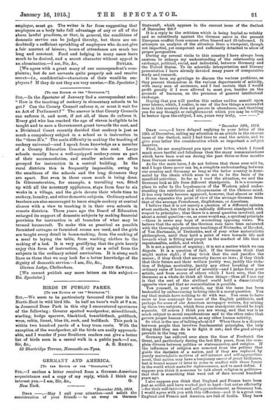DIGNITY AND DOMESTIC SERVICE.
[To TH. EDITOR Or TOM "EirrCT■708.1 Sra,—The Spectator has reached the servants' hall, and need I any that we who are fortunate enough to read that journal are greatly interested in the correspondence appearing under the above heading P May I voice the views of some of those who form the subject-matter, as to the causes of what is lamented, and the means to be adopted to improve matters P Granting all that " Northerner" says as to the necessity and importance of domestic work for the welfare of the family and the nation, can it be truly contended that a large part of the services of domestics at the present day can be so designated P This is a large question, Mr. Editor, with which you will be better able to deal than your questioner, but he humbly submits that, if a servant is employed in administering to the mere " fads " and "foibles" of those whose only "right" to such services is that they are able to "pay the wages," there can be no " dignity " in such labour. The first thing required, therefore, is that employers should be careful to demand no services that cannot be rendered without loss of respect, either to themselves or those who serve, for upon its due observance depends whether a servant " looks up " or is bemeaned. It will be all to the good when domestic service is recognized as a profession, because before that stage is reached certain lawful conditions of present-day service will inevitably have been altered or swept away. Amongst these are unlimited hours of labour. Any domestic servant is liable to be called upon at any time; overtime is unknown. The remains of the truck system of food and lodging in lieu of wages will be altered. Servants may be robbed of value in victuals and bed without remedy. The present system of private verbal and written characters, which puts a servant at the mercy of any
employer, must go. The writer is far from suggesting that employers as a body take full advantage of any or all of the above lawful practices, or that, in general, the conditions of domestic service can be judged thereby, but there are un- doubtedly a sufficient sprinkling of employers who do not give a fair amount of leisure; hours of attendance are much too long and constant. Food and lodging in many cases leave much to be desired, and a secret character without appeal is
an abomination.—I am, Sir, &c., BUTLER.
[We agree with a great many of our correspondent's com- plaints; but do not servants quite properly ask and receive secret—i.e., confidential—characters of their would-be em- ployers P If they do not they are very unwise.—En. Spectator.]



































 Previous page
Previous page